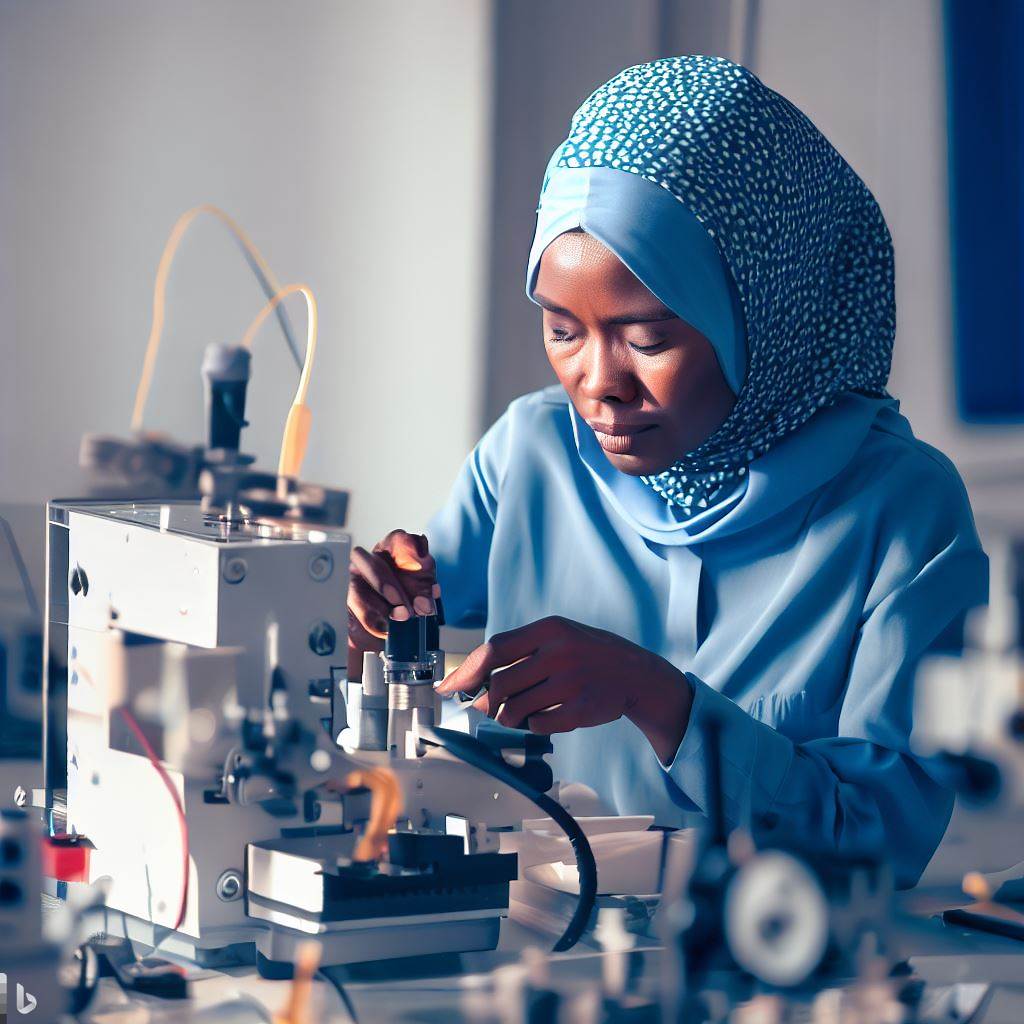Introduction
Women play a vital role in the field of opto-mechanical engineering, contributing to innovation and diversity. In Nigeria, there is a growing need for women to join and excel in this field.
Brief Overview of the Importance of Women in the Field of Opto-Mechanical Engineering
Women bring diversity and fresh perspectives to opto-mechanical engineering, fostering innovation and creativity.
Their inclusion helps address the gender gap in STEM fields, promoting equality and empowering future generations.
Mention of Nigeria’s Context and Need for Women in this Field
- Gender Balance: Encouraging women to pursue opto-mechanical engineering promotes gender equality in Nigeria’s workforce.
- Untapped Potential: There is a vast pool of talented women who can contribute significantly to the field.
- National Development: Involving women in engineering fields enhances technological advancement and economic growth.
- Role Models: Female opto-mechanical engineers can inspire young girls to pursue careers in STEM.
- Inclusive Solutions: Diverse perspectives lead to solutions that cater to the needs of everyone.
By breaking barriers and supporting women in opto-mechanical engineering, Nigeria can harness the full potential of its workforce and drive progress in the field.
Historical Background of Women in Engineering
Brief history of women’s involvement in engineering globally
Women have made contributions to engineering throughout history, despite facing numerous challenges.
In the 19th century, some women started to pursue engineering, although they faced discrimination and limited opportunities.
During World War I and II, women’s involvement in engineering increased due to a shortage of male engineers.
However, after the wars, women’s contributions were often overlooked, and they faced barriers to advancement.
In the 1960s and 1970s, the women’s liberation movement sparked a renewed push for gender equality in engineering.
Organizations like the Society of Women Engineers were formed to support and advocate for women in the field.
Today, women continue to make significant advancements in engineering globally, although gender disparities still exist.
Overview of the challenges faced by women in pursuing engineering careers in Nigeria
In Nigeria, women face various challenges in pursuing careers in engineering. Cultural and societal norms often discourage women from entering male-dominated fields like engineering.
Limited access to quality education and resources hinders women’s ability to pursue engineering careers. Stereotypes and biases create a hostile environment that marginalizes women in engineering.
Lack of female role models and mentors in engineering exacerbates the challenges faced by women.
Balancing family responsibilities and societal expectations makes it harder for women to fully commit to their engineering careers.
Discrimination and gender bias in the workplace limit women’s opportunities for career growth and advancement.
Additionally, women in Nigeria often face challenges related to inadequate infrastructure and funding in the engineering sector.
Despite these challenges, many Nigerian women are breaking barriers and excelling in opto-mechanical engineering.
They are paving the way for future generations of women engineers and inspiring change within the industry.
In the end, the historical background of women in engineering globally highlights the progress made and the ongoing challenges faced by women in the field.
In Nigeria, women encounter specific hurdles that hinder their pursuit of engineering careers.
However, the resilience and determination of Nigerian women in opto-mechanical engineering are driving positive change and breaking barriers for future generations.
It is essential to continue supporting and advocating for gender equality in engineering to create a more inclusive and diverse industry.
Read: Career Pathways: Becoming an Opto-Mechanical Engineer in Nigeria
The Current Status of Women in Opto-Mechanical Engineering in Nigeria
Statistics regarding the number of women in the field
The field of opto-mechanical engineering in Nigeria is predominantly male, with women being significantly underrepresented.
According to recent statistics, only 15% of opto-mechanical engineers in Nigeria are women.
This glaring gender disparity raises concerns about the lack of diversity and inclusion in this field.
It is crucial to address the factors that contribute to this imbalance and work towards creating a more equitable environment.
Examination of the factors contributing to the imbalance (social, cultural, and educational)
Several factors contribute to the underrepresentation of women in opto-mechanical engineering in Nigeria. Social stereotypes and cultural expectations often discourage women from pursuing careers in STEM fields.
Furthermore, the educational system also plays a significant role in perpetuating this gender imbalance.
Limited access to quality education and STEM programs for girls further restricts their opportunities to explore and develop an interest in opto-mechanical engineering.
Additionally, unconscious biases and gendered perceptions of technical fields may affect the recruitment and promotion of women in this profession.
Workplace discrimination and unequal treatment further hinder their professional growth.
Examples of successful women opto-mechanical engineers in Nigeria
Despite these challenges, there are inspiring women who have broken barriers and achieved success in opto-mechanical engineering in Nigeria.
Their stories serve as beacons of hope and motivation for aspiring women engineers.
One such example is Dr. Ngozi Eze, who is a renowned opto-mechanical engineer and an advocate for women in STEM.
Dr. Eze’s groundbreaking research in optical design has earned her international recognition, and she has been instrumental in mentoring and encouraging young women to pursue careers in this field.
Another inspiring figure is Engr. Adaobi Okonkwo, who has established herself as a leading expert in opto-mechanical systems.
Her innovative contributions in the development of precision optical instruments have revolutionized the field, and she actively works towards creating more opportunities for women in engineering.
These success stories highlight the immense talent and potential that women bring to opto-mechanical engineering.
It is crucial to celebrate and support such trailblazers, as they pave the way for a more inclusive and diverse future in this field.
In short, the current status of women in opto-mechanical engineering in Nigeria reflects a significant gender imbalance.
This disparity is influenced by societal, cultural, and educational factors that discourage women from entering the field.
However, there are successful women engineers who serve as role models and advocates, inspiring future generations of women to pursue careers in opto-mechanical engineering.
By addressing the root causes of this imbalance and promoting inclusivity, we can create a more equal and vibrant engineering community in Nigeria.
Read: Challenges Faced by Flight Engineers in Nigeria Today
Breaking Barriers: Initiatives Promoting Women in Opto-Mechanical Engineering
Overview of organizations and programs supporting women in STEM in Nigeria
- Women in Opto-Mechanical Engineering Society (WOMES): WOMES is a non-profit organization dedicated to empowering women in the field of opto-mechanical engineering.
They aim to break down barriers and create a supportive community for women engineers in Nigeria. - Society of Women Engineers (SWE): SWE is a global organization that promotes the advancement of women in engineering and technology careers.
They provide resources, networking opportunities, and mentorship programs to support aspiring women engineers. - Nigerian Women in Science and Technology (NWST): NWST is a platform that encourages women to pursue careers in STEM fields.
They offer scholarships, training programs, and workshops to equip women with the necessary skills and knowledge in opto-mechanical engineering. - Association of Professional Women Engineers in Nigeria (APWEN): APWEN is a professional body that advocates for the inclusion and advancement of women engineers in Nigeria.
They offer mentoring programs, scholarships, and networking events to support women in their engineering journey. - Women’s Technology Empowerment Centre (W.TEC): W.TEC is a non-profit organization that aims to bridge the gender gap in technology-related fields.
They provide various initiatives, including training programs and mentorship, to support women interested in opto-mechanical engineering.
Discussion on scholarships, mentorship, and networking opportunities provided for aspiring women engineers
- Scholarships: Many organizations mentioned above provide scholarships specifically for women pursuing opto-mechanical engineering degrees.
These scholarships cover tuition fees, books, and other educational expenses, enabling women to access quality education in this field. - Mentorship Programs: Mentoring plays a crucial role in the professional development and success of women engineers.
Organizations like WOMES and SWE facilitate mentorship programs, connecting experienced professionals with aspiring women engineers.
These mentors provide guidance and support, helping young women navigate the challenges of opto-mechanical engineering. - Networking Opportunities: Networking is essential for career growth and opportunities.
Women-focused organizations host networking events, conferences, and forums where women engineers can connect with industry professionals, potential employers, and like-minded individuals.
These platforms help women build valuable relationships and expand their professional network. - Professional Development Workshops: To enhance the skills and knowledge of women engineers, organizations such as NWST and APWEN organize workshops and training programs.
These workshops cover topics like optical design, mechanical engineering principles, project management, and technical advancements, empowering women with the latest industry knowledge. - Collaborative Projects: Initiatives promoting women in opto-mechanical engineering often encourage collaborative projects among women engineers.
By working together on real-world projects, women gain practical experience, build teamwork skills, and showcase their abilities in the field.
In essence, several organizations and programs in Nigeria strive to support and empower women in opto-mechanical engineering.
Through scholarships, mentorship, networking opportunities, and professional development initiatives, aspiring women engineers can overcome barriers and achieve success in this field.
These initiatives play a vital role in breaking down gender-based stereotypes and promoting gender equality in STEM careers.
Read: Understanding the Demand for Opto-Mechanical Engineers in Nigeria

Success Stories: Inspiring Women in Opto-Mechanical Engineering in Nigeria
Interviews or Profiles of Prominent Nigerian Women Engineers in the Field
- Interview with Dr. Adaobi Okoye: Dr. Adaobi Okoye is a trailblazer in the field of opto-mechanical engineering in Nigeria. In a recent interview, she shared her journey and experiences.
- Profile of Engr. Funke Adeyemi: Engr. Funke Adeyemi is a renowned Nigerian woman engineer who has made significant contributions to the opto-mechanical engineering industry. Her story is truly inspiring.
- Interview with Dr. Ngozi Eze: Dr. Ngozi Eze’s passion for opto-mechanical engineering led her to overcome numerous challenges. Her interview sheds light on her remarkable achievements.
Highlighting their Accomplishments, Challenges Faced, and Steps Taken to Overcome Barriers
- Dr. Adaobi Okoye’s Accomplishments: Designed and implemented innovative opto-mechanical systems for healthcare applications.
Published several research papers in renowned international journals. Received numerous awards for her contributions to the field. - Engr. Funke Adeyemi’s Challenges Faced: Limited access to quality education and technical resources in the early stages of her career.
Gender bias and stereotypes often undermined her credibility and skills. Struggled to find professional networking opportunities to enhance her career growth. - Steps Taken to Overcome Barriers: Dr. Adaobi Okoye actively sought mentors within the field of opto-mechanical engineering. Engr.
Funke Adeyemi joined professional organizations and attended conferences to connect with like-minded professionals.
Both women emphasized the importance of perseverance and continuous self-improvement. - Dr. Ngozi Eze’s Achievements: Developed advanced opto-mechanical systems for renewable energy applications.
Established a successful research institute dedicated to promoting women in engineering. Mentored and inspired numerous aspiring female engineers throughout her career.
Remarkable Nigerian women engineers in opto-mechanical engineering inspire aspiring women by shattering gender roles and excelling in their field.
They show determination and resilience despite challenges, emphasizing equal opportunities and support in STEM fields.
Dr. Adaobi Okoye, Engr. Funke Adeyemi, and Dr. Ngozi Eze serve as role models for future generations.
Promoting inclusivity and overcoming barriers unlocks Nigeria’s potential in opto-mechanical engineering.
Encourage girls to explore STEM with education, mentorship, and societal attitude change for greater gender equality.
Read: Diversity in the Cockpit: Flight Engineering in Nigeria
Uncover the Details: Working Conditions of Flight Engineers in Nigeria
Strategies to Encourage More Women in Opto-Mechanical Engineering
Recommended steps for educational institutions, government, and industry
- Implement programs and scholarships specifically targeted towards women interested in engineering fields.
- Provide mentoring and support networks for women studying opto-mechanical engineering.
- Create partnerships with industry leaders to offer internships and job placement opportunities for female engineering graduates.
- Introduce gender diversity policies and initiatives within educational institutions, government bodies, and engineering organizations.
- Develop and promote engineering outreach programs that focus on inspiring girls to pursue opto-mechanical engineering.
Promoting inclusivity, gender equality, and dismantling gender biases
- Establish a culture of inclusivity, where both male and female engineering students are encouraged and supported equally.
- Implement policies that promote work-life balance and support for employees, including maternity leave and flexible working hours.
- Conduct gender sensitivity training for educators, employers, and industry professionals to address unconscious biases and promote fair treatment.
- Recognize and celebrate the achievements of women in opto-mechanical engineering to inspire and encourage other women to join the field.
- Encourage male allies to actively support and advocate for gender equality in opto-mechanical engineering.
Addressing STEM stereotypes and encouraging girls from an early age
- Organize science fairs and exhibitions to showcase the diverse opportunities and applications of opto-mechanical engineering.
- Collaborate with schools to introduce hands-on engineering activities and workshops for girls.
- Promote female role models in the field of opto-mechanical engineering through guest lectures and industry presentations.
- Engage with parents and educators to address societal prejudices and encourage girls to pursue STEM subjects.
- Offer scholarships and grants specifically for girls interested in studying opto-mechanical engineering.
By implementing these strategies, educational institutions, government bodies, and industry leaders can pave the way for more women to excel in the field of opto-mechanical engineering.
Creating an environment that fosters inclusivity, dismantles gender biases, and encourages girls from an early age will not only benefit women but also contribute to a stronger and more diverse engineering community.
It is vital that the barriers hindering women’s participation in engineering professions are broken down, allowing their talent and contributions to flourish.
With concerted efforts, Nigeria can witness a thriving generation of women in opto-mechanical engineering, propelling the nation towards technological advancements and economic growth.
Conclusion
The significance of women in opto-mechanical engineering in Nigeria cannot be overlooked. Let us encourage breaking barriers and providing opportunities for women in this field.
It is crucial to take action and offer more support, recognition, and empowerment to women engineers in Nigeria.
The inclusion of women in opto-mechanical engineering is vital for Nigeria’s growth and progress.
By encouraging and supporting women in this field, we can bridge the gender gap in STEM.
Diverse perspectives lead to innovative solutions and advancements in technology.
Nigeria’s workforce can benefit from the untapped potential of talented women engineers.
Promoting gender equality in engineering will inspire future generations to pursue STEM careers.
Let us break barriers and create an inclusive environment where women thrive in opto-mechanical engineering.
Together, we can build a brighter and more prosperous future for Nigeria’s engineering landscape.




